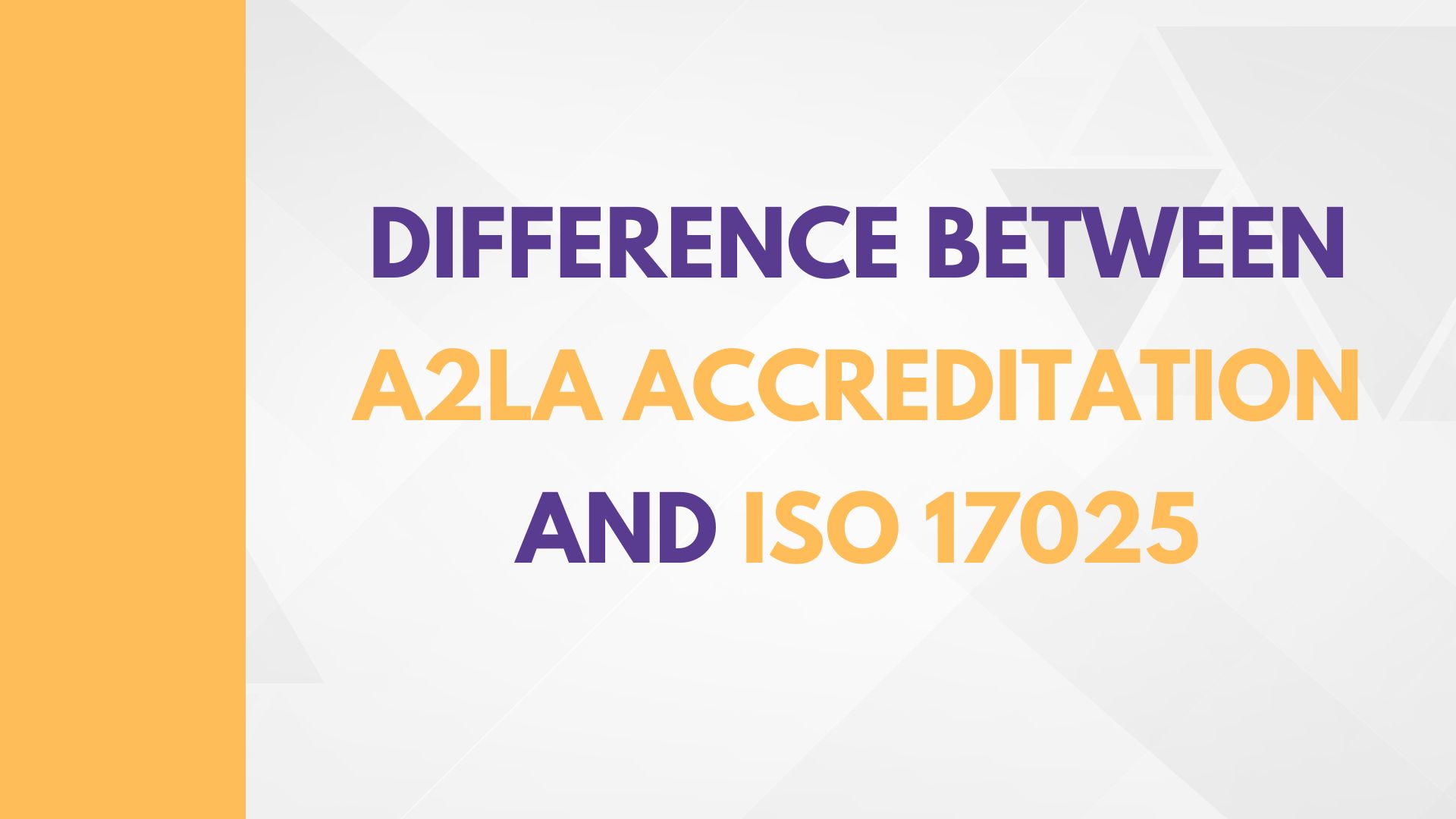A2LA Accreditation and ISO 17025
are both critical benchmarks in the field of laboratory testing and
calibration. A2LA Accreditation is a recognition granted by the American
Association for Laboratory Accreditation, demonstrating a laboratory's
competence and adherence to specific standards. ISO 17025, on the other hand,
is a globally recognized standard that establishes the general standards for
laboratories' competence, impartiality, and consistency. While A2LA
Accreditation can encompass ISO 17025 requirements, it also emphasizes
additional criteria based on industry-specific needs. In essence, both A2LA
Accreditation and ISO 17025 play pivotal roles in establishing the credibility
and reliability of laboratories, with A2LA adding a layer of specialization to
the broader framework provided by ISO 17025.
Understanding A2LA
Accreditation and ISO 17025
A2LA Accreditation, granted by
the American Association for Laboratory Accreditation, goes beyond the basic
requirements outlined by ISO/IEC 17025. It serves as a testament to a
laboratory's adherence to specific industry-related standards. A2LA, being a
reputable accrediting body, assesses laboratories with a critical eye towards
specialized industries, ensuring that their processes, methodologies, and equipment
align with the unique demands of their field. This means that laboratories
seeking A2LA Accreditation not only comply with ISO 17025 but also exhibit a
higher level of specialization, offering tailored expertise to their clients.
ISO/IEC 17025, developed jointly
by the International Organization for Standardization (ISO) and the
International Electrotechnical Commission (IEC), sets out general requirements
for the competence, impartiality, and consistency of laboratories. This
standard serves as a global framework, providing laboratories with a structured
approach to quality management. Laboratories that adhere to ISO 17025
demonstrate their commitment to maintaining a robust quality management system,
leading to increased confidence in their testing and calibration results.
Key similarities between A2LA
accreditation and ISO 17025
Some of the key similarities
between A2LA accreditation and ISO 17025 are:
1- Both are based on the same standard, ISO 17025,
which defines the criteria for laboratory competence.
2- Both require a laboratory to undergo an initial
assessment and periodic surveillance audits by an external body to verify its
compliance with ISO 17025.
3- Both aim to ensure the quality and consistency
of laboratory results and to enhance customer confidence and satisfaction.
4- Both enable a laboratory to participate in
interlaboratory comparisons, proficiency testing and peer reviews to evaluate
its performance and identify areas for improvement.
5- Both facilitate the exchange of information and
cooperation among laboratories and other stakeholders in the testing and
calibration sector.
Differences Between A2LA Accreditation and ISO 17025
1. Geographic Scope:
A2LA accreditation primarily applies to laboratories in the
United States. It's a regional accreditation body. On the other hand, ISO 17025
is an international standard recognized and used worldwide.
2. Scope of Coverage:
A2LA offers accreditation services for a wide range of
laboratory activities beyond just testing and calibration, including inspection
and proficiency testing providers. ISO 17025 focuses specifically on the
technical competence and quality management systems of testing and calibration
laboratories.
3. Applicability:
Laboratories seeking A2LA accreditation undergo a thorough
assessment by A2LA assessors, and the accreditation process is tailored to
A2LA's specific requirements. ISO 17025 provides a more general framework for
laboratory accreditation that can be adopted by various accreditation bodies
around the world.
4. Recognition:
While A2LA accreditation is recognized and respected within
the United States, ISO 17025 is globally recognized and accepted. Laboratories
accredited to ISO 17025 can demonstrate their competence on an international
scale.
5. Focus on Impartiality:
ISO 17025 places a strong emphasis on the impartiality and
independence of laboratories. This includes requirements for managing conflicts
of interest and ensuring that laboratory personnel are not influenced by
external pressures.
How Different Laboratories Can Benefit from A2LA or ISO
17025?
A2LA and ISO 17025 are two internationally recognized
standards for the accreditation of testing and calibration laboratories. These
standards provide a framework for ensuring the quality, competence, and
reliability of laboratory services. By following these standards, laboratories
can demonstrate their ability to produce accurate and consistent results, meet
customer requirements, and comply with regulatory obligations.
Some of the benefits of A2LA or ISO 17025 accreditation for
laboratories are:
- Enhanced
reputation and credibility: Accreditation can help laboratories gain
recognition and trust from their customers, stakeholders, and peers. It can
also increase their marketability and competitiveness in the global arena.
- Improved
efficiency and effectiveness: Accreditation can help laboratories optimize
their processes, procedures, and resources. It can also facilitate continuous
improvement and innovation, as well as reduce errors, risks, and costs.
- Increased
customer satisfaction and loyalty: Accreditation can help laboratories meet or
exceed customer expectations and needs. It can also foster long-term
relationships and partnerships with customers, as well as enhance customer
feedback and communication.
- Greater
compliance and conformity: Accreditation can help laboratories adhere to
relevant laws, regulations, and standards. It can also facilitate the
acceptance and recognition of their test results across different countries and
regions.
Conclusion
In the world of laboratory
testing and calibration, A2LA Accreditation, and ISO 17025 stand as two pillars
of quality assurance. While both uphold the principles of competence and
reliability, A2LA Accreditation adds a layer of specialization, catering to the
unique demands of specific industries. On the other hand, ISO 17025 provides a
globally accepted foundation for laboratory practices, ensuring consistency and
credibility across diverse sectors. The choice between these two standards
ultimately depends on the nature of the laboratory's services and its target
clientele. Whichever path a laboratory chooses, both A2LA Accreditation and ISO
17025 offer valuable tools to enhance scientific integrity and ensure accurate
results.

